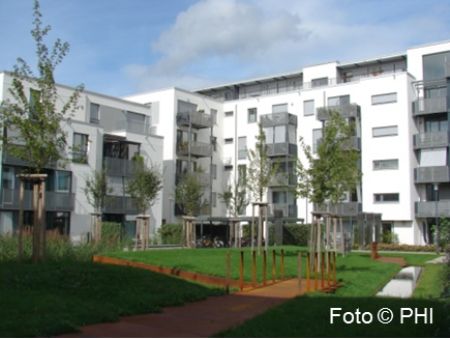This is an old revision of the document!
Table of Contents
Passive House for municipalities
| Welcome to the Passive House for municipalities section! This section will present information to provide support to municipal decision-makers who are looking for solutions to improve climate protection at the municipal level, from the building sector perspective. |
Climate protection at municipal level
Climate change affects us all. In order to effectively tackle climate change, we must reduce our energy consumption significantly in the long term. This means efficient use of available energy and placing maximum priority on saving energy. Cities and local authorities are important actors when it comes to climate protection – at the local level, with every individual, every community, in every region.
On average, about 40 % of the total energy consumption in industrialized countries is used for buildings. That is why significant improvement of the energy efficiency of buildings has considerable impact on the overall assessment of a town, municipality or urban district in terms of energy. Due to the long service life of buildings, a consistent approach is especially important in this respect.
For more than 20 years, the Passive House Institute has committed itself to the advancement of the Passive House Standard, with which an improvement of 40 to 75 % in the energy consumption for heating and cooling of new builds can be achieved; in the case of refurbishments, reductions of 75 to 95 % are commonplace.
The Passive House Institute has compiled the following 10 points to support and to trigger effective climate protection measures in the building sector at the local level:
1) Passive House legislation for new public buildings and retrofits
2) Legislation for land belonging to local authorities
3) Municipal urban planning adapted to climate
4) Passive House legislation for municipal housing companies
5) Financial incentive programmes
6) Quality assurance by means of milestones
7) Climate-neutral urban districts with Passive House Standard
8) Further training and informational events
9) Encouragement of use of energy-saving technologies
10) Dissemination of the Passive House Standard and the use of renewable energies at the municipal level
(Based on the position paper of the Passive House Institute regarding the use of Passive House technology as a contribution to climate protection in the building sector for cities and communities by Wolfgang Feist, March 2014).
| The sole responsibility for the content of Passipedia lies with the authors. While certain marked articles have been created with the support of the EU, they do not necessarily reflect the opinion of the European Union; Neither the EACI nor the European Commission are responsible for any use that may be made of the information contained therein. |
Suggestion for future grant policy
- - Use given opportunities: “If you do it, do it right“.
- - Quality is decisive, less important is when this quality is implemented!
- - Focus on grants for individual measures (based on an overall concept for the building).
- - Achieve improvement of the comfort and quality of existing buildings step by step via individual measures / via grants for individual measures
- - Support the clients via Passive House Designers and Passive House Tradespersons.
- - Give grants for a third-party (neutral!) quality assurance.



